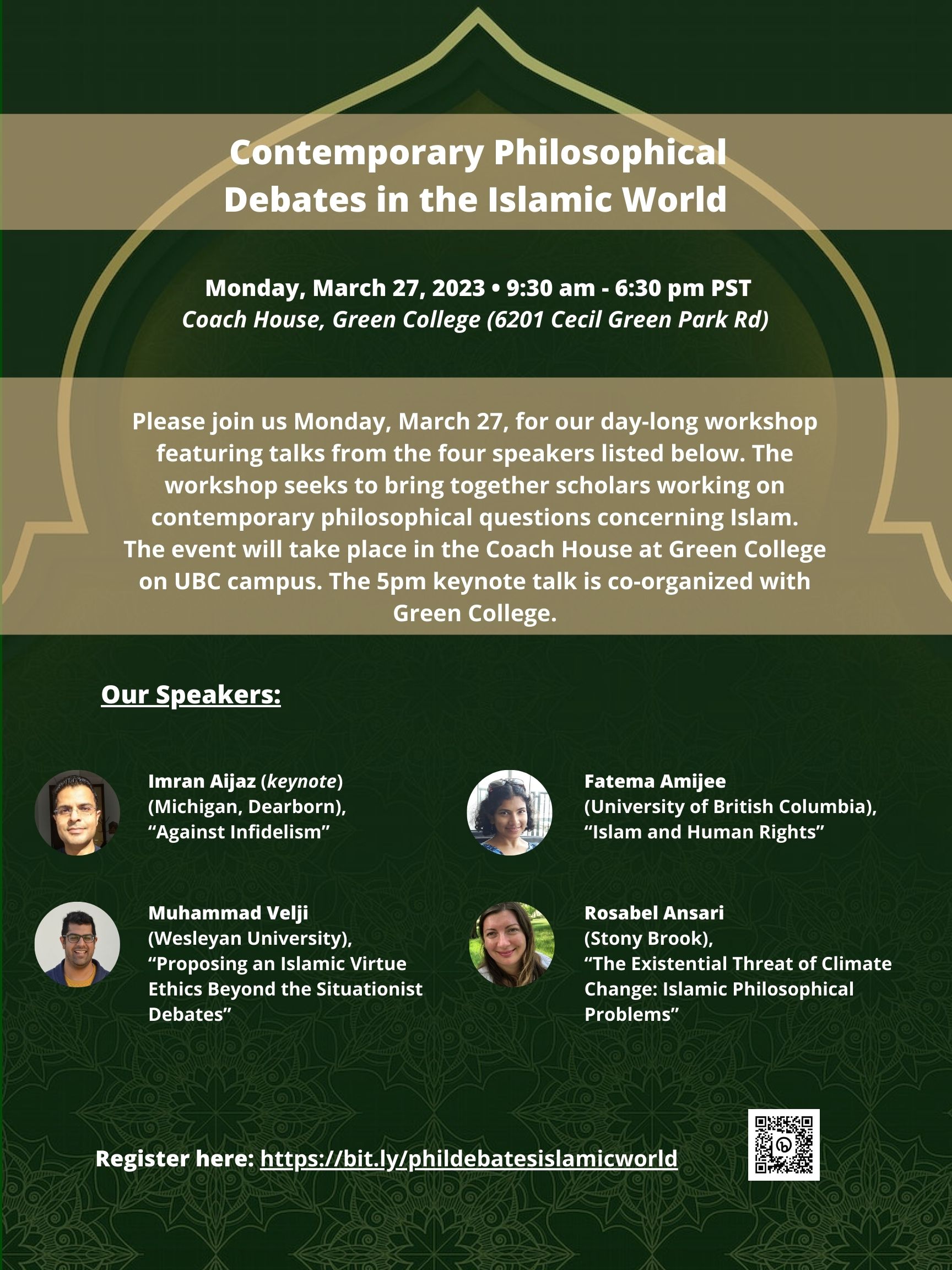Contemporary Philosophical Debates in the Islamic World
-
Fatema Amijee, Philosophy, UBC; Rosabel Ansari, Asian and Asian American Studies, Stony Brook University; and Muhammad Velji, Philosophy, Wesleyan University
Coach House, Green College, UBC
Monday, March 27, 9:30am-4:45pm -
-

Schedule:
9:30am: Welcome and refreshments
10-11:30am: Fatema Amijee (UBC), “Islam and Human Rights”
Can the human rights we recognize today be grounded in the central Muslim text, the Qur’an? I will argue that they can, but that this requires reconceptualising the believer’s relationship to revelation. On the standard view, the believer is bound by all prescriptions in the Qur’an. By contrast, I will argue that the Qur’an prescribes two distinct kinds of norms—thin norms and thick norms—and only the latter have normative force here and now. With this novel framework for understanding Qur’anic norms on the table, I will address two barriers to grounding human rights in the Qur’an: the problem of Omission, according to which there are rights that we want to recognize that are seemingly missing in the Qur’an, and the problem of Rejection, according to which the Qur’an seems committed to rejecting some rights that we do want to recognize. I will argue that both problems can be overcome.
11:30-11:45am: Coffee Break
11:45am-1:15pm: Muhammad Velji, (Wesleyan University), “Proposing an Islamic Virtue Ethics Beyond the Situationist Debates”
In this paper I use ethnography of a contemporary Islamic group called the women’s dawa movement to try to show a concrete virtue ethic that can think and move beyond the situationist problem. Here I will concentrate particularly on the situationist worry that mood can subtly influence our ethical actions away from virtue. I begin the first part by introducing the situationist problem more fully and how it should make us question the traditional understanding of virtues as intrinsic dispositions. I then introduce Islamic virtue ethics and the dawa movement as well as motivate why I use that movement specifically and why I use ethnography. In part two and three I examine ethnography of the dawa movement to explore how they deal with worries about the influence of mood on their virtue. In part two I show how they train their habits in order to be more resilient when faced with virtue diminishing affective situations. In part three I show, rather than hindering them, how the movement integrates the situation into helping them achieve piety. I conclude by showing the creativity of the dawa movement by demonstrating a unique way that they can deal with the objection that 'one cannot avoid all bad situations.'
1:15-3:15pm Lunch Break
3:15-4:45pm: Rosabel Ansari (Stony Brook), “The Existential Threat of Climate Change: Islamic Philosophical Problems”
Since the appearance of the United Nations’ “Global Warming of 1.5°C” IPCC report in 2018, public discourse has increasingly framed global climate change as an existential threat to humanity that results from our reliance on fossil fuels. This notion that climate change is both anthropogenic, i.e., caused by human activity, and risks endangering life on earth invites philosophical reflection concerning human nature and our function on earth. In this presentation I bring the classical tradition of Islamic philosophy into conversation with the contemporary issue of climate change to explore what climate changes means for classical doctrines concerning the relationship between God and human beings, theories of evil and suffering, and the rational faculty as definitive of human nature. Does God love human beings? Do we have a special function on earth? Does rationality constitute the human species? According to the Islamic philosophical tradition human beings are uniquely endowed with reason and the capacity to transcend the functions of the lower self, such as appetite and consumption. What does it mean, therefore, for our conception of humanity if we set ourselves on a path to self-destruction by over consumption? I discuss these topics together with the perspective of other contemporary Islamic theologians and philosophers on evil and suffering.
4:45-5pm: Coffee Break
5-6:30pm: Keynote Address by Imran Aijaz (Michigan, Dearborn), “Against Infidelism”
According to the thesis of what I call ‘Infidelism’, some people can reasonably be identified as ‘infidels’. The Islamic variant of this thesis, Islamic Infidelism, states that some people can reasonably be identified as kafir (an ‘infidel’ or ‘disbeliever’). In my talk, I will present a case against Infidelism. Although my case is primarily aimed at Muslims, it can be applied mutatis mutandis to Infidelism as it is advocated in other religions, such as Christianity. The core of my argument rests on two claims: (1) In Islamic theology, the kafir is someone who knowingly rejects religious (Islamic) truth, and (2) We (Muslims) are never in a position to reasonably identify some people as kafir. As part of my talk, I will discuss why rejecting Infidelism is important. It is not a causally inert thesis, as some Muslims will act on it. For instance, many Muslims are told not to be friends with infidels, not to marry them, not to imitate them, etc. In more morally problematic situations, some are urged to take up arms against infidels. If my case against Infidelism is sound, one impetus for such actions will be removed.
For more information on the keynote, visit the keynote event page.6:30-7pm: Reception in the Piano Lounge, Green College
This workshop has been organized by Fatema Amijee, Philosophy, UBC, and attendance is open to the UBC community.

-
-
Unless otherwise noted, all of our lectures are free to attend and do not require registration.
Custom Lecture Fields
|